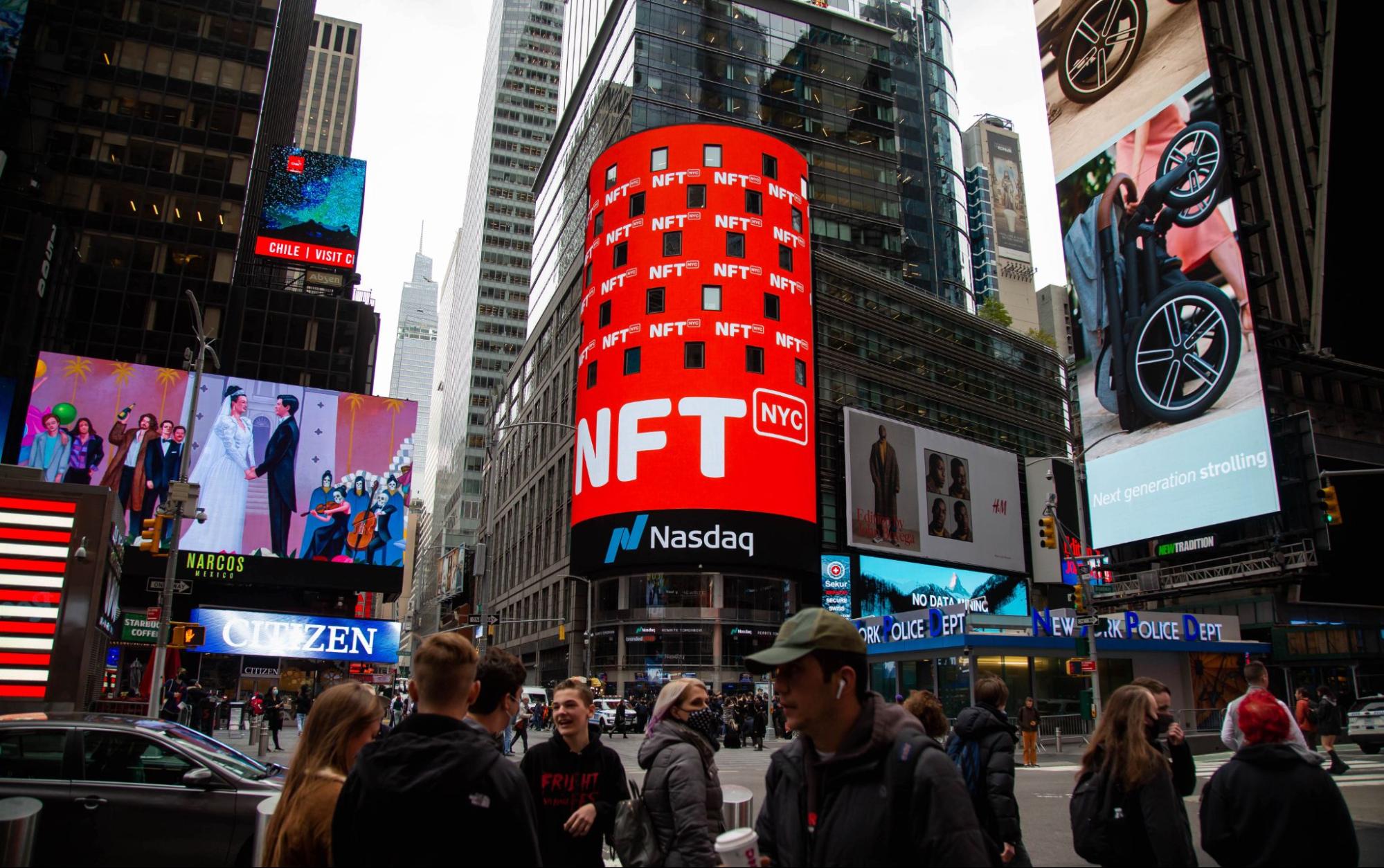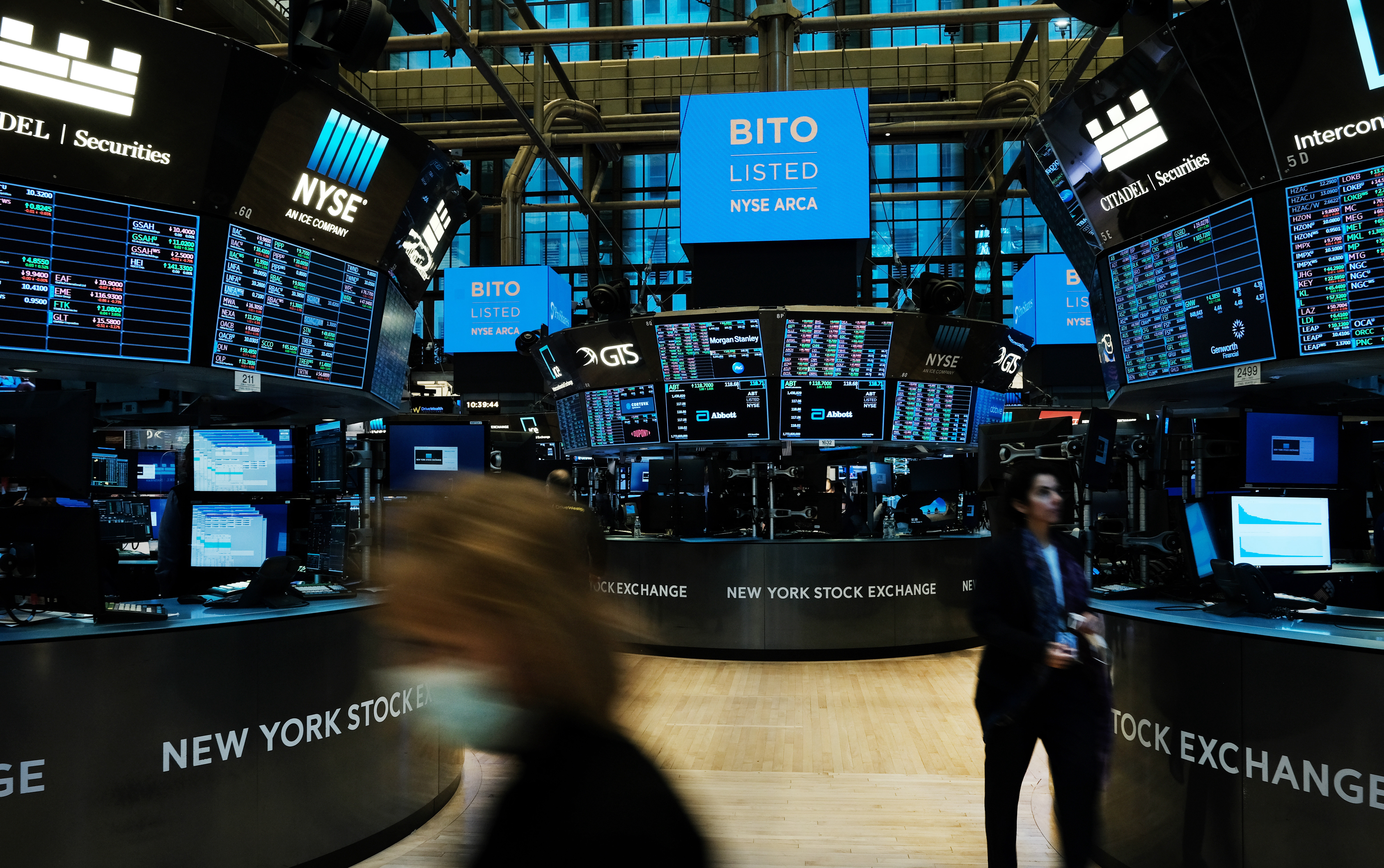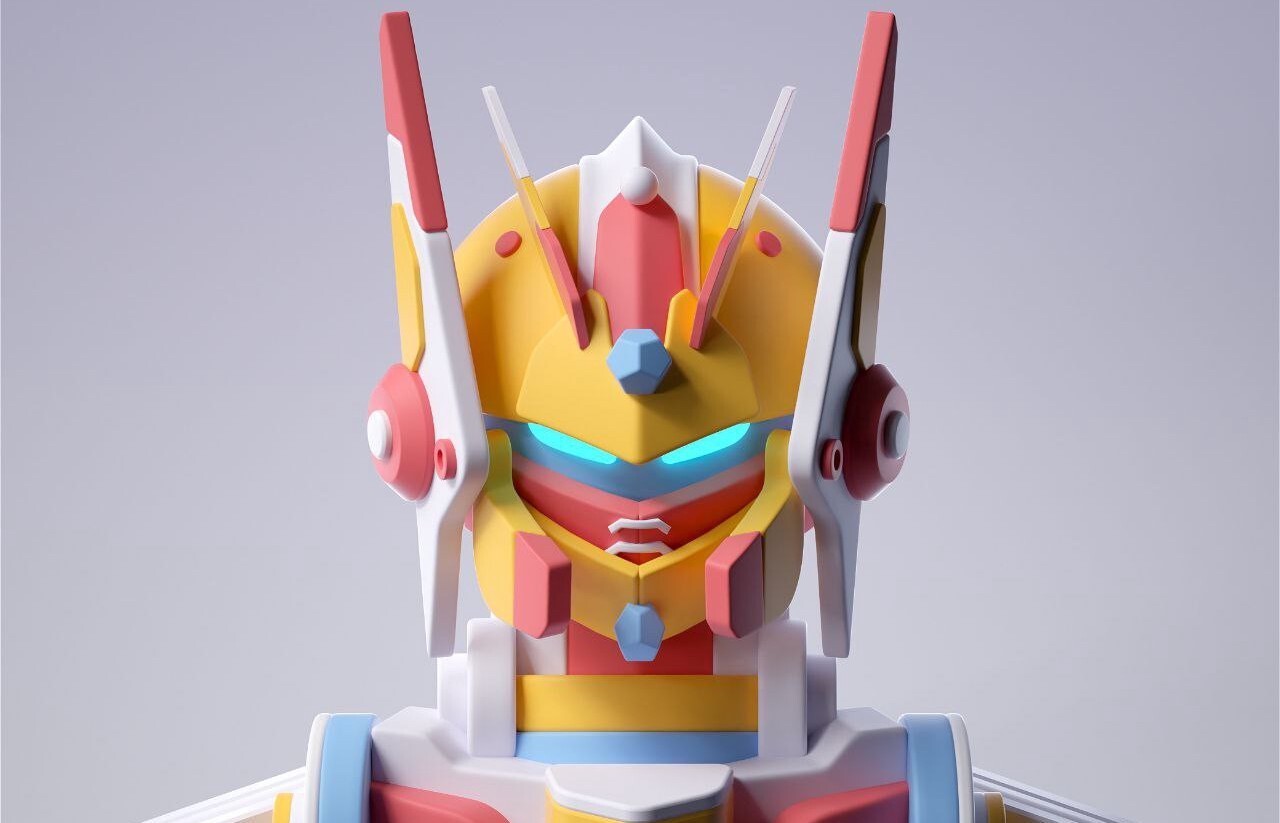NYC celebrates NFTs with a massive event

NFT.NYC, the “leading annual non-fungible token event,” is taking over Times Square this week with panels, guest speakers, and plenty of digital art. [Bloomberg via Getty Images]
There’s never a dull moment on the blockchain. Here’s what you need to know this week:
New York City is hosting a massive NFT conference. We’re sharing an update from NFT.NYC.
Ethereum hit all-time highs, as SHIB outpaced DOGE. After an “Uptober” boom, can crypto markets maintain momentum?
Paypal co-founder warns of an inflation “crisis” and other takes from this week’s crypto news.
Coinchella
Earth’s biggest NFT party celebrates a record-breaking year
This week, NFT creators, protocol developers, VC investors, influencers, and fans from around the world are descending on New York for NFT.NYC, the largest annual NFT conference. After a year in which NFTs rose from obscurity to front page news, NFT Twitter has been buzzing for weeks about the chance to finally gather and meet the faces behind the pricey avatars at events ranging from a Bored Ape Yacht Club Party on an actual yacht to a screening of a Beeple documentary with the artist himself in attendance. Let’s dig in.
The NFT art world has plenty to celebrate right now. Top NFT marketplace OpenSea broke a new record with more than 293,000 users buying and selling digital art and collectibles via the platform in October. In other blockbuster news, a single Bored Ape sold at Sotheby’s for more than $3.4 million (as the entire project surpassed $1 billion in sales), while Fidenza artist Tyler Hobbs sold more than $7 million in “golden tokens” redeemable for works no one has seen yet.
As part of Facebook’s “Meta” rebranding, the company hinted that NFT support will be coming to its metaverse. Meanwhile, Reddit posted a job listing seeking an engineer to help build a platform to “create, buy, sell and use NFT-backed digital goods,” and GameStop posted job listings related to a Web3 gaming platform and an NFT marketplace.
Software giant Adobe announced that Photoshop will soon allow artists to link their crypto wallets and include tools to help ensure that buyers on major marketplaces know the work is authentic. Ubisoft, developer of popular games such as Assassin’s Creed, invested in blockchain gaming company Animoca, a backer of the NFT-based game Axie Infinity. Ubisoft’s CEO said: "[Blockchain] will enable more play-to-earn that will enable more players to actually earn content, own content, and we think it's going to grow the industry quite a lot.”
At NFT.NYC, speakers from Quentin Tarantino (who is selling unreleased scenes from Pulp Fiction as NFTs) to Gary Vaynerchuk are discussing the future of the space. Across the city, dozens of satellite events have brought together an entire music festival’s worth of top DJs and performers — from Steve Aoki (who headlined Adam Bomb Squad’s bash) to Quavo of Migos (who played an event sponsored by NBA TopShot).
Why it matters… The scale of NFT.NYC and the steady drumbeat of headlines from industries including Hollywood, fashion, and publishing all point to the ambitions of the NFT community — even those who don’t consider themselves tech-savvy. Digital artist Storm Ritter, who was in Times Square to see her work displayed on a massive digital billboard told us, “I’m not even that into technology, but now that I’ve learned about how to immerse my work in a digital realm, it's transformed how I see how I can market my work, and it's pretty amazing.”
SHIB Season
Ethereum hits new all-time high as SHIB overtakes DOGE
Ethereum hit a new all-time high north of $4,600 on Tuesday — propelled by the rise of digital art, decentralized finance, stablecoins, and increasingly … the dog-themed Shiba Inu (SHIB) coin. In the latest Gamestop-style, meme-powered craze, SHIB saw 800% gains in October as its market cap reached roughly $40 billion on the last day of the month, overtaking the $35 billion total value of the OG meme token, Dogecoin (DOGE). All of these popular crypto categories drive traffic on the Ethereum blockchain, and as a result of a recent protocol upgrade, all that traffic is having an outsized impact on the supply and demand of ETH. Here’s how it works.
ETH’s ascent began near the end of July, just before a critical software upgrade called EIP-1559 went live. As a result of the upgrade, a small amount of ETH is “burned” — permanently removed from circulation — with every transaction, reducing the total supply. Assuming demand is constant, basic economics tells us reducing supply should cause prices to rise. The upgrade’s goal was to make transaction fees more predictable, although not necessarily more affordable.
Since the upgrade went live, over $3 billion worth of ETH has been removed from the supply. The leading source of ETH burning? Transactions on NFT marketplace OpenSea have removed more than 92,000 ETH — worth around $400 million.
The Shiba Inu token (SHIB) also became a leading ETH burner this week. Unlike DOGE, which operates on its own blockchain, SHIB is an Ethereum token, which means it’s compatible with the broader Ethereum ecosystem. Popular applications include Shibaswap, a decentralized exchange created by SHIB’s developers that is now trading around $100 million in value per day.
Another ETH upgrade called Altair quietly went live this week, laying the groundwork for Ethereum’s highly anticipated shift to Ethereum 2.0 (or ETH2) — which will replace the mining system currently used to verify transactions with a method called “proof of stake.” Proof of stake is theoretically faster and less energy-intensive than mining, and should increase transaction speeds while lowering fees. It could also reduce the supply of ETH even more.
ETH isn’t the only major crypto to break records recently. Last week, Bitcoin hit a new all-time high above $66,000 after the first-ever U.S. BTC futures ETF listed on the New York Stock Exchange. Many analysts believe similar Ethereum ETFs could emerge in the coming months. Open interest for ETH futures on the Chicago Mercantile Exchange hit record highs above $1 billion in October, potentially indicating heightened demand from institutional investors.
Why it matters… ETH’s popularity is a double-edged sword — as demand surges, costs to use the network are often so high that they can dwarf the value of smaller transactions. ETH2, which is currently slated for 2022, aims to solve the network’s scaling challenges. In the meantime, rival technologies that offer faster and cheaper transactions via alternative blockchains are booming: more than $20 billion in ETH has been “bridged” to sidechains and “layer 2” solutions like Polygon and Arbitrum.
Takes
El Salvador buys the dip, PayPal co-founder regrets waiting to buy bitcoin
Stable condition… A highly anticipated report on stablecoins from U.S. financial agencies recommended that Congress enact new legislation to regulate them. The report proposes a new term, “payment stablecoins,” and acknowledges that if well designed and appropriately regulated, they could “support faster, more efficient, and more inclusive payments options.”
Hold me tender... “We just bought the dip! 420 new #Bitcoin ���🇸🇻,” tweeted El Salvadoran president Nayib Bukele on October 27. Earlier this year, El Salvador became the first nation to make BTC legal tender.
Raising coin… Digital Currency Group, the firm behind crypto asset manager Grayscale, raised $700 million in a SoftBank-led investment round, the second-largest in the crypto space after FTX’s $900 million fundraise. David Lawee, a general partner at CapitalG, one of the round’s investors, explained his firm’s timing: “This is finally getting to the point where crypto is a broader thing than just Bitcoin.”
Back to school… The University of Pennsylvania's Wharton School will accept crypto tuition payments from students interested in a new blockchain class. “It’s a program about blockchain and digital assets, we felt that we should talk the talk and walk the walk,” said Guido Molinari, managing partner at the crypto consultancy Prysm Group, which is developing the course with Wharton.
Thiel talk... PayPal co-founder and tech billionaire Peter Thiel says he regrets not buying bitcoin earlier. He took the stage at a conference Sunday to warn that the crypto’s all-time highs could signal that the economy is facing real (and not transitory) inflation. “You know, $60,000 Bitcoin, I’m not sure that one should aggressively buy,” he said. “But surely what it is telling us is that we are having a crisis moment.”
TOKEN TRIVIA
What is the Lightning Network?
A
A symphonic rock group from the 1970s
B
A “layer 2” technology that’s making bitcoin payments faster and cheaper
C
Facebook’s digital wallet for sending and receiving money internationally
D
A global, decentralized network of computers
Find the answer below.
Trivia Answer
B
A “layer 2” technology that’s making bitcoin payments faster and cheaper











